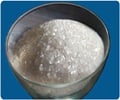People with fructose malabsorption - a food intolerance that is as complicated as it is common - are turning to low FODMAP diet, which stands for six sugars, to tackle the condition.

Usually described as "fructose intolerance", but often extending to malabsorption of other sugars, scientists believe the condition could affect almost half of the 15 per cent of Australians with irritable bowel syndrome (IBS), and be the prime trigger of symptoms such as diarrhea, constipation, bloating and pain.
Diagnosis is confirmed by a breath-test, and the number of specialist diagnostic centers in Melbourne has risen since 1999 from one to an estimated 18.
Jackie Love, a 44-year-old French teacher, claimed her painful and socially awkward IBS symptoms have disappeared after following FODMAP diet and she's not alone.
Love can eat bananas but not apples. Beans but not snow peas. Gluten but not wheat.
"I really have to look at every single thing I put in my mouth," said Love.
Advertisement
"There are lots of diets being promoted ... but this is one where we know why it works," the Age quoted Dr Shepherd as saying.
Advertisement
One of her patients, Natalie Nott, said "FODMAPs has really changed everything."
Relieved of her irritable bowel syndrome symptoms, last year she self-published the Low Fodmap Cookbook, which has sold about 600 copies, and has 1000 subscribers to her blog.
She says dining out is still difficult, but restaurants such as Fox in the Box, in Hampton, and The Firehouse, in Ringwood, now cater specifically for FODMAPs.
Food companies Naturally Good and Simply Wise include a "fructose-friendly" label on relevant products.
Dr Shepherd says better diagnosis of fructose malabsorption has made the condition seem more prevalent, although some speculate that increased fructose in our diets, particularly from high-fructose corn syrup in many processed foods, is also to blame.
But Australian Medical Association president Steve Hambleton said the incorrect perception of food allergies and intolerances was also on the rise, and warned that the FODMAP diet should only be used under professional guidance.
"You need to go to a GP first to make sure you don't have a serious, treatable medical condition - especially one of the inflammatory bowel diseases," he said.
"There is an objective increase in recognized food intolerances, But there's probably an equal number of people who think they're intolerant or allergic without robust reason," he added.
Source-ANI















